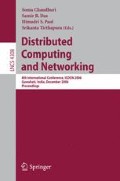Abstract
There is a handshake between two nodes in a network, if the two nodes are communicating with one another in an exclusive mode. In this paper, we give a mobile agent algorithm that allows to decide whether two nodes realize a handshake. Our algorithm can be used in order to solve some other classical distributed problems, e.g., local computations, maximal matching and edge coloring. We give a performance analysis of the algorithm and we compute the optimal number of agents maximizing the mean number of simultaneous handshakes. In particular, we obtain Ω(mδ/Δ2) simultaneous handshakes where m is the number of edges in the network, and Δ (resp. δ) is the maximum (resp. minimum) degree of the network. For any almost Δ-regular network, our lower bound is optimal up to a constant factor. In addition, we show how to emulate our mobile agent algorithm in the message passing model while maintaining the same performances. Comparing with previous message passing algorithms, we obtain a larger number of handshakes, which shows that using mobile agents can provide novel ideas to efficiently solve some well studied problems in the message passing model.
Access this chapter
Tax calculation will be finalised at checkout
Purchases are for personal use only
Preview
Unable to display preview. Download preview PDF.
References
Métivier, Y., Saheb, N., Zemmari, A.: Randomized rendez vous. In: Mathematics and computer science: Algorithms, trees, combinatorics and probabilities. Trends in Mathematics, pp. 183–194. Birkhäuser, Basel (2000)
Métivier, Y., Saheb, N., Zemmari, A.: Randomized local elections. Information Processing Letters 82, 313–320 (2002)
Métivier, Y., Saheb, N., Zemmari, A.: Analysis of a randomized rendez vous algorithm. Information and Computation 184, 109–128 (2003)
Duchon, P., Hanusse, N., Saheb, N., Zemmari, A.: Broadcast in the rendezvous model. In: Diekert, V., Habib, M. (eds.) STACS 2004. LNCS, vol. 2996, pp. 559–570. Springer, Heidelberg (2004)
Reif, J., Spirakis, P.: Real time resource allocation in distributed systems. In: 1st Symp. on Principles of Distributed Computing, pp. 84–94. ACM, New York (1982)
Hibaoui, A.E., Métivier, Y., Robson, J., Saheb-Djahromi, N., Zemmari, A.: Analysis of a randomized dynamic timetable handshake algorithm. Technical Report 1402-06, LaBRI (2006)
Litovsky, I., Métivier, Y., Sopena, E.: Graph relabelling systems and distributed algorithms. In: Handbook of graph grammars and computing by graph transformation, vol. 3, pp. 1–56. World Scientific, Singapore (1999)
Chalopin, J., Métivier, Y.: A bridge between the asynchronous message passing model and local computations in graphs. In: Jedrzejowicz, J., Szepietowski, A. (eds.) MFCS 2005. LNCS, vol. 3618, pp. 212–223. Springer, Heidelberg (2005)
Chalopin, J., Métivier, Y.: Election and local computations on edges. In: Walukiewicz, I. (ed.) FOSSACS 2004. LNCS, vol. 2987, pp. 90–104. Springer, Heidelberg (2004)
Hanckowiak, M., Karonski, M., Panconesi, A.: On the distributed complexity of computing maximal matchings. In: 9th Symp. on Discrete Algorithms, pp. 219–225. ACM-SIAM, New York (1998)
Loväsz, L.: Random walks on graphs: a survey. Combinatorics. Combinatorics, Paul erdos is eighty 2, 353–397 (1996)
Barrière, L., Flocchini, P., Fraigniaud, P., Santoro, N.: Can we elect if we cannot compare? In: 15th Symp. on Parallel Algo. and Architectures, pp. 324–332. ACM, New York (2003)
Chalopin, J., Godard, E., Métivier, Y., Ossamy, R.: Mobile agent algorithms versus message passing algorithms. Technical Report 1378-05, LaBRI (2005)
Peleg, D.: Distributed computing - A locality-sensitive approach. SIAM Monographs on discrete mathematics and applications (2000)
Author information
Authors and Affiliations
Editor information
Editors and Affiliations
Rights and permissions
Copyright information
© 2006 Springer-Verlag Berlin Heidelberg
About this paper
Cite this paper
Derbel, B. (2006). Efficient Distributed Handshake Using Mobile Agents. In: Chaudhuri, S., Das, S.R., Paul, H.S., Tirthapura, S. (eds) Distributed Computing and Networking. ICDCN 2006. Lecture Notes in Computer Science, vol 4308. Springer, Berlin, Heidelberg. https://doi.org/10.1007/11947950_33
Download citation
DOI: https://doi.org/10.1007/11947950_33
Publisher Name: Springer, Berlin, Heidelberg
Print ISBN: 978-3-540-68139-7
Online ISBN: 978-3-540-68140-3
eBook Packages: Computer ScienceComputer Science (R0)

